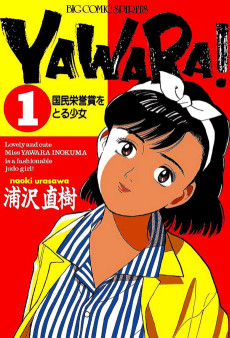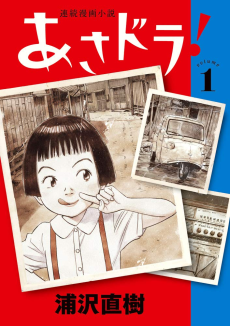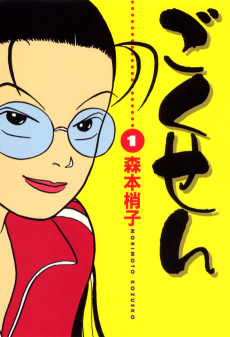HAPPY!
STATUS
COMPLETE
VOLUMES
23
RELEASE
March 8, 1999
CHAPTERS
254
DESCRIPTION
One day the Yakuza comes knocking on the door of the orphaned Umino siblings. The oldest brother has gone into hiding after acquiring a huge debt. Afraid for her brother, Miyuki agrees to take responsibility for the loan. The yakuza wants her to become a ho, Miyuki wants to be a tennis pro. Turns out she used to be a very promising player before her parents died. However, becoming a pro is difficult when friends are few and everybody else conspires to make Miyuki's life hell.
(Source: Anime News Network)
CAST
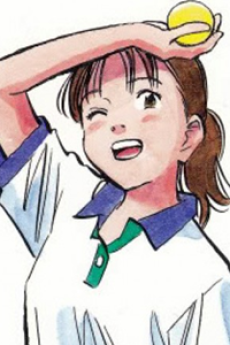
Miyuki Umino
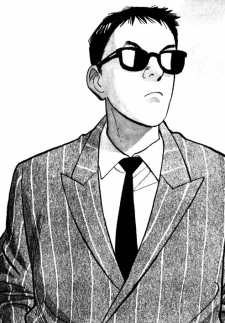
Junji Sakurada
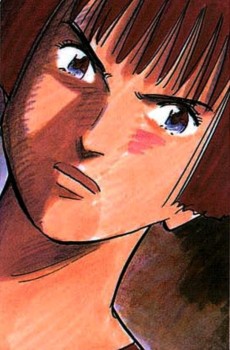
Kaku Okiku
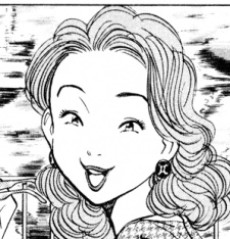
Chouko Ryuugasaki
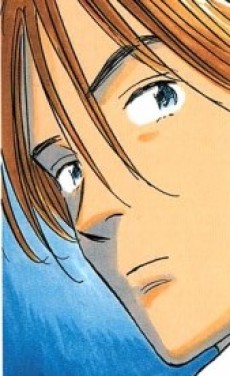
Keiichirou Ootori

Thunder Ushiyama
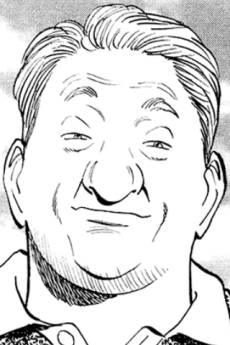
Alan Carrington
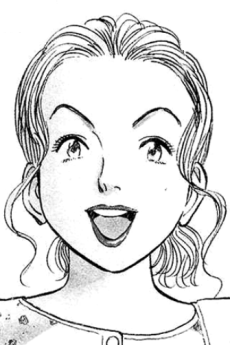
Wendy Palmer
CHAPTERS
REVIEWS

saulgoodman
80/100Urasawa tests his readers' patience with an underdog tale that's anything but happyContinue on AniListAn underdog protagonist is by no means a scarcity in the sports genre. If anything, they're a tried-and-true character archetype that's almost ubiquitous to sports stories. Who doesn't love that rush of satisfaction, witnessing the voices of dissent and doubt against the struggling underdog steadily dissipate into cheers of support for the prevailing hero? However, Urasawa chuckled as he trashed this trope and crafted a capital U underdog story.
Spoilers ahead! Skip to the end for a short, spoiler-free review

I'm seeing a Whole Lotta Red I recommend chanting religious sutras for 10 days and 10 nights in-between chapters. Those with impatient souls will need to invoke Buddha's compassion and patience for the entirety of Happy!; a story laced with many diabolus ex machina ensuring the constant demise of our severely underdog heroine.
Perhaps it was naïve of me plunging in, believing that I'd be enveloped in lukewarm drama that'd steadily boil to warm benevolence, from being coddled and conditioned from other sports series. Barring a few characters, Happy! is a story with no such compassionate development. For roughly the first half of the series, Urasawa relentlessly bullies Miyuki in practically every panel she's in. Her miserable situation worsens by the page, as the weight of her poverty, family situation and tennis increases tenfold in every passing chapter. Though incredibly frustrating it may be, I'd refuse to label Urasawa's writing as hot garbage.
Diving into the story, Miyuki is an immediately sympathetic character. The aforementioned poverty she's in and pressure from debt collector Sakurada pushes the angelic and naïve Miyuki into stumbling and tripping into the world of professional tennis. Accompanied and helped by no one but herself initially, it's all too easy to drop Happy! in a heartbeat. The first half of the story is a massive wall of frustration. Whiny siblings, a gruff debt collector, a man-child rich boy, a snobbish rich lady and, of course, She-Who-Shall-Not-Be-Named. The first half is an absolute onslaught of forced drama. I begrudgingly have to confess, though; I eventually grew numb to the extravagancy of drama. Daresay, I came to enjoy it during the last sprint of the story's first half. The sheer amount and intensity of diabolus ex machina made this story nearly theatrical, as Urasawa slyly manages to worsen the situation of Miyuki and co. in a frustratingly enjoyable way. Nevertheless, those who manage to ball their fists and grit their teeth through it, are in for a marginally less painful later half.
While the first half is dedicated to Miyuki's jaw-slackened induction into professional tennis, the second half focuses on reinforcing and honing herself. This is where Happy! begins to reveal something else beneath its thick exterior of frustration, namely character development. The character development, for several characters, takes the forefront and compromises the anger-inducing plot points' monopoly of the narrative. Transfixed at center of it all and most impactful of the story's narrative, is Miyuki's growth.

The Payoff First and foremost, those seeking intricately nuanced characters will be sorely disappointed. Urasawa employs the exaggerated characters of his cast to develop and progress the story, at the cost of his audience's patience. Miyuki is a prime instance of such. Her "nice, clumsy girl" nature dully veneers her character for the entire first half of the story, chucking in charcoals of frustration among the flames of sympathy we feel for her. However, the second half manages to salvage and even articulate on the dull traits I've just described. Though Happy! is certainly an infuriating underdog story, it's nevertheless one you can't help but root for.
Miyuki's burdens of family, debts and horrible publicity have weighed her down for a majority of the series. Our frustration continues garnering as much as the interest of her brother's debt, but it's paid back much later in the story. The infuriating waves of boos and snarky tennis fans are drowned out as Miyuki's focus on tennis is heightened. For the longest time, Miyuki's objective was simply to earn money to fulfill the debts. However, along the way, her burdens increased and weighed down her A-game. She only saw that her tennis negatively affected her family and friends, never sparing a moment's thought about herself and what she truly desired. Namely, enjoying tennis. The multitude of conflicts and turmoil she experiences steadily steer Miyuki back to her original reason for playing tennis; because she loved playing it as her father taught her to. In the last tournament of the story, the finale of Miyuki's growth is a serious pay off for our accumulated frustration. Miyuki's usual airheaded straightforwardness turns into burning transfixion on winning. Winning not for the money, but to reach the pinnacle.
The single thing that carrot-and-stick'd me through the first half of the story was Sakurada, the debt collector. The development that Urasawa hid many other characters from, he fed to the rough-spoken yakuza. Ironically, Sakurada was my most hated character initially. His smug mug, explicit demeanor and belittlement of Miyuki's situation and endeavor as a professional tennis player was distilled of any redeeming characteristic. I internally groaned whenever he appeared, halfheartedly expecting him to be a thorn-in-the-side gag character for the entirety of the story. To my utter delight, however, he became a strong driving force of enjoyment with his steady development and relationship with Miyuki. His unexpected soccer past empathetic to Miyuki's tennis struggle was a catalyst for growth early on. His one-dimensional roughness molded into projected bitterness over his regrets. Though he questioned and mocked Miyuki's endeavors, Sakurada's subtle support for her took ahold of his otherwise bland character early on; as he slowly changed from another mob hater into one of Miyuki's scarce supporters. Add in Sakurada's unchanging profane personality and banter, and his relationship with Miyuki also had an enjoyably amusing change of heart. Unlike Kaku and Keiichiro, who've always voiced cheerful support for Miyuki, Sakurada only emitted his support in the form of a silent fist-shake of joy or anger at her dissenters often mistook as his usual violent tendencies. In short, Sakurada grew into quite a knucklehead tsundere in the first half of the story.
Into the second half, though, Sakurada's development truly began to take afoot. His subtle support turned much more explicit and his thoughts about Miyuki drastically changed. He let Miyuki and her siblings to live in his house after they were kicked out of their own, he yells encouraging words for her in games, they eat her homemade curry together, they fight and show concern for each other right after. The sneers of mockery at Miyuki's plight were replaced by unwavering encouragement and an anger directed at the entire world who shunned her. His roughness mitigated Miyuki's blinding sweetness, his shady career as a debt collector offset Miyuki's naïve trust in everything and yet they both grew to care about each other. Sakurada and Miyuki's relationship has won its place as the highlight of Happy! by a landslide and a half. Though the ending was a kick in the nuts....
Moving on, then there's also Keiichiro. Whew. A snail-paced development if I've ever saw one. Keiichiro's candle-burning growth is a prime example of what defines Happy!. Slow-churning and frustratingly dramatic. And I reluctantly loved every moment of it and his facepalming moments of idiocy. He goes through several arcs and mood swings, consisting of his rebellion against his coddling mother, adaptation to a meager runaway lifestyle, reluctance with his planned marriage, his hesitance and struggle to return to tennis as a professional, etc. Nearly every panel of Keiichiro's panel time garners a sigh of frustrated pity, yet enjoyably disbelieving enough to continue witnessing just how much worse his plight grows. Again, I warn those severely afflicted with impatience. His cycles of development and regression may cause you to see red, but I found them extremely investing.

She-Who-Shall-Not-Be-Named Urasawa has a knack for infuriating rich female characters. From Eva in Monster to Audrey Culkin in Billy Bat, I wouldn't have fathomed that Urasawa could top himself in writing a more dully annoying pest of a character. Well, slap my neck and spin me around 6 times on the head. Choko is, simply put, a villain among villains. Rather than infuriation, I was in utter disbelief by her zero-dimensionality. Was this thing truly created by the same master craftsman who birthed Monster?
However, I'm reluctant to say that Choko complements Urasawa's playful side of writing. I could practically hear Urasawa cackling along with Choko's bursts of "kyahahaha". Urasawa also possesses a magical knack for incredibly intelligent mastermind antagonists. Where we have Monster's Johan and 20th Century Boys' Friend on the spectrum, Choko somehow fits in there, as well. Contrary to her tame ditzy and childish personality, Choko has a surprising mastery over controlling and swaying public opinion, media, people and miniscule details that enthralled me into reading her next move. As hard as it may be, if one is able to see past the obvious infuriating nature of Choko's entire character, you'll come to begrudgingly relish in her shitty farces. The single issue I had, though, is that Urasawa sprinkled in some hints of genuineness in Choko towards the end of the series. I certainly wouldn't go as far as saying it was a flailing, last minute attempt to redeem and develop Choko but I would've preferred if Urasawa had simply kept Choko as the one trick pony villainous he had maintained her as for the entire series.

Bande Dessinée Admittedly, one of the strongest reasons that lured me into Happy!'s grasps was Urasawa's charismatic art-style. Popping with diverse character designs and animated facial expressions, Urasawa's art is such an enjoyable experience, even if it's standalone. Happy!'s comparatively lighthearted tone to Urasawa's usual hard-hitting mysteries dresses up the playful art-style all the more lively and complementary.
Divorcing the art from character designs, there's not much to comment on. Simplistic and undetailed, it very much complements the slice-of-life nature of this series. From a sports/action perspective, there wasn't any difficulty in following the natural flow of panels during the intense games. The constant commentary dialogue in the very same panels did border on cluttering, but by no means did it make it tedious to read and follow.

Yeah, I love sportsball Though tennis jargon is thrown around occasionally and a large part of the story is about the sport, the game is secondary to the slice-of-life aspect of Happy!. It's very much an accessory for the characters' development, moreso than an honest-to-god sports story detailing the mechanics of the game. You won't be hard-pressed to learn the technicalities about tennis, instead zero in on what it does for our characters.

Conclusion Frustratingly enjoyable, Happy! is ill-suited for anyone with impatience and distaste for irrational characters. Beneath the mask, however, Urasawa facilitated a great underdog story, albeit extremely slow-burning. Featuring a cast chalk full of illogical and often infuriating characters, you'll either come to love or hate them for it. If you're able to trudge past the first half of the story, the latter half may be a cool compress of relief for the severe burns of annoyance. A few important characters finally get their past-due development, all varying in degrees of enjoyment, that may not fully diminish the severe anguish felt at the first half, but were nonetheless a great improvement in narrative. With severely post-phoned payoff and a slightly disappointing ending, it's difficult to recommend this emotionally vexing series to anyone but those patient enough to withstand irrational and immortal drama. If you're a masochist like myself, however, you'll revel in the utter, stinking cesspool of near-theatrical conflicts and slow development, though some developments you may also find inexcusable.
Extremely heavy on exaggerated drama, you'll either drop the story or become accustomed to the persisting predicaments that batter our innocent heroine at every corner and turn. There's no steady uplift, either. No gradual gain of public support or opponent recognition that's often found in other sports series exists in this story.
Whether you're a veteran or new to Urasawa, his art-style will instill great enjoyment. His character designs pop with life and playfulness. Simple, diverse and humorous; the characters are visually appealing and humorous. Regarding its existence as a sports series, Happy! does a manageable job depicting the intensity of the games with generally smooth and easy-to-follow paneling.
Contrary to my summary, Happy! is everything INCLUDING happy. Eating curry with her siblings and being beaten down by the entire world, Miyuki still salvages happiness within the deepest sewages with her naïve, persevering character. Exaggerated as Happy! may have depicted it, life is a persistent and viscous cycle of ups and downs. When it comes down to it, it's ultimately you who can realize where your happiness lies and bring it to actuality.


C00kieMaster
60/100A Manga That Probably Made Naoki Realize He is Not Suited for Sports FictionContinue on AniListAfter an pleasant experience watching Yawara! for 124 episodes. I wanted more. So I picked up Happy! which is another story made by the same authour that centers around sports. Little did I know this was far from the same experience that I got watching Yawara!.
Naoki Urasawa is not really the best visual artist, his art is pretty good, uniquely distinct in the way he draw characters. But for something like sports where motion and action is a huge part of the appeal, he falls short. It is still not bad tho, but in comparison to absolutely amazing sports art like Slam Dunk and Teppuu he really cannot compare. Again, not saying its bad tho, it is just really mediocre. This weakness extends to his poor incorporation of sports in a sports manga which is either because he choose not to or he is weak at it I really do not know. But judging from his later works which does not contain sports at all, my guess is that is realized he does not really know how to actually incorporate the sports in a sports fiction and moved on from that direction.
What Naoki Urasawa excels in at least in my experience watching Yawara! is his story and character writing. In both Yawara! and Happy! we are introduced to a girl that is struggling with her pursuit of a hobby that she once enjoyed only to be faced with several obstacles either from people or otherwise. In both Yawara! and Happy! there are 'villains' with not so redeemable qualities that stands in Yawara's pursuit of her own happiness. The only difference is that in Yawara! even if those characters are assholes they are at the very least funny and entertaining. The major contempt I have for his writing decisions in Happy! is that the asshole characters that is standing in poor Miyuki Umino's way are literally just unredeemable dirt bags that I want to personally strangle. Naoki Urasawa is incorporating a writing technique known as kicking the dog; a common method to have the audience garner sympathy and root for a character that is being mistreated hence the term 'kicking the dog'. Inokuma Yawara from... Yawara! definitely had the kick the dog treatment time after time but at the very least we are rewarded with heartwarming moments that give feel good vibes. But in the misleadingly titled Happy! really ramped up the dog kicking to a unberable absurd. Literally half of the chapters are just dedicated to freaking dog kicking and there so much nasty stuff that I am not surprised this never got a anime adaptation. There is just so much dog kicking that one person can take before it just becomes a negative experience and that was why I really did not enjoy most of the chapters in Happy!.
Naoki Urasawa probably wanted to emulate and repeat the success of his previous work Yawara! by making another 'sports focused' story about a girl struggling with her passions and pursuits of tennis. In this alternate iteration, instead of a genius Judo practitioner it is a genius tennis player but with more gripping stakes. In hindsight I can see why he wanted to change things up because seriously repeating the same story and feel is just a recipe for stagnation and he probably wanted to try new things and introduce them to fans that probably already watched and enjoyed Yawara!. While I did not like Happy! as much as I absolutely adore Yawara!, it was a decision that I understand and stand by because in the field of creative work I always want artists and creators to introduce new things on the table instead of the same done and dusted tropes.
In conclusion, a pretty weak but bold attempt to emulate his success from Yawara! but just falls flat due to the excessive dog kicking and lack of emphasis on creating a work that is enjoyable to be consumed. Definitely not his best work but an interesting work to compare and understand Naoki's growth as a writer.

sadkey
45/100Urasawa's underdiscussed tennis drama aims to displeaseContinue on AniListThis is more of a ramble than a review, I wrote it while approaching the end of the series and finished it up after I completed the series. It is not as polished as I would like
In 1994, Naoki Urasawa began writing what would arguably become his magnum opus – the mystery/thriller series Monster. A series known for its convincing character writing, clever direction, and incredibly well researched subject material – we’re fast approaching the 30th anniversary of this series and yet the series remains a popular topic of discussion to this very day. The same cannot be said about Naoki Urasawa’s preceding work, Happy! (sic)
When reading Happy! I was under the impression that this was a work that far preceded the complex & thrilling mystery stories Urasawa ended up being most well-known for. This series felt worlds away from that. Yet, Happy! Only began serializing in 1993 – and would continue serializing until 1999. This is quite frankly baffling, because while Urasawa was writing what many consider to be the perfected form of his approach to storytelling he was also writing this series that did just about everything with SO much less finesse.
Happy! Is a story about a tennis player – Umino Miyuki – and her struggles to make money for her family after the passing of her parents. Things go from bad to worse, however, when her older brother racks up a massive debt and then disappears, leaving the debt collectors to demand the money from the already struggling Miyuki. The debt is not one that can be practically paid off, so the debt collectors cruelly suggest she turn to outright prostitution. She adamantly refuses, and then by chance hears that a recent tennis champion won enough money to both clear the amount she owes and then some. Miyuki had always been great at tennis, but once her parents passed she decided to dedicate her energy to taking care of her younger siblings – but given the choice between rekindling her old tennis flame and selling herself to pay off the debt, the choice is obvious for her.
As harsh of a premise as it is, it’s nowhere near a bad one. The kind of desperation built into the premise makes for the girl’s tennis matches to feel pretty meaningful – a loss feels crushing. A win feels exhilarating. The matches in this comic are genuinely pretty well done too – my point of comparison for a sports comic is admittedly pretty limited, I never read Prince of Tennis or Baby Steps or anything similar – so I guess I don’t have any idea of what would constitute a GOOD tennis comic. For what it’s worth, though, I feel like these matches are well illustrated, and the intensity is able to be felt through the pages. I don’t have any issue with it – at least, not when Urasawa goes the distance with these matches. Often times Urasawa treats the matches like a forgone conclusion – after setting the tone, Urasawa will often skip large portions of the match in favor of moments he deems more interesting. There are times where a player will begin to make a comeback, and rather than write and illustrate the entire exchange he’ll just settle with showing the first point being scored...and then quickly flash forward to the underdog having scored five more times. It's a bit of a shame – it becomes very clear very quickly that the nooks and crannies of the sport Urasawa chose to be the “focus” of the story isn’t actually one he wants to do much with. Every sports drama has a large focus on the human drama surrounding the sport. In Happy! especially though, after a while it feels like Urasawa just isn't interested in the sport happening at all. Often times games will happen while other characters are doing their own things – things that the comic focuses on instead of the tennis matches. I genuinely want to give Yawara! a shot, if only for the fact that I feel like Urasawa IS capable of writing a good sports comic. Happy, unfortunately, is not too concerned with being a sports comic at all.
Urasawa works are known for having loads of characters, but Happy! is comparatively restrained. Not that there aren’t plenty of characters to keep track of, but its mainly (perhaps mercifully?) limited to a few standouts. Otori, Miyuki’s senior and potential love interest – a rich heir to a filthy rich former tennis champion. Additionally, Otori’s mother – an overprotective, manipulative, and ridiculously vindictive woman. Even her vindictiveness pales in comparison to Chouko – a rival tennis player with a crush on Otori – also, a massive legion of adoring fans (as she herself is a rising star in the tennis scene). There’s the coach Thunder – a lecherous disgraced former tennis coach who lost his standing after he was revealed to having been involved in match fixing late in his career. There’s also Junji Sakurada, the debt collector, whose character arc is probably the closest Happy! Comes to matching the kind of character development Urasawa would later be known for.
Happy! is, opposite to its name, incredibly mean spirited. It starts with Chouko and Otori’s mother, both characters that influence Umino’s career heavily, that immediately take an extremely antagonistic tone towards her because of equally petty reasons. For one of these characters, the vindictiveness takes a back seat to their own interests. For the other, however, this grudge basically dominates their character for almost the entirety of the series. It is a really ridiculous dynamic where the stars constantly align to make Umino’s life miserable, and even when Umino triumphs Chouko manages to find a way to make that victory feel hollow anyway. It is intentionally frustrating, and it is a patience tester beyond anything else I’ve read. I have read comics about serial killers that are less cruel-feeling than this comic does at times.
You can’t make a convincing and satisfying underdog story without there being hardships to overcome. I don’t want this story to not have antagonists. Having a hate sink character is a little less interesting, but it’s a completely serviceable way of writing these kinds of stories. There’s a point, however, where a character feels so ridiculously over the top that it stops being even remotely enjoyable to be upset with. Chouko crosses that line by a mile – and to Urasawa’s credit, there are some points where Chouko is so ridiculously vindictive that for a brief period of time you might begin to find her so evil it loops back around to making her likable. She’s so evil it becomes difficult to take her seriously, and honestly? When you hit those moments in the story, Chouko as a character feels completely warranted. Her relationship with Umino is hilariously toxic, and her reasons for hating Umino are ridiculously flimsy, and yet at times it feels like it wouldn’t “work” otherwise. And full disclosure, at this point this is where it’s basically up to you whether Chouko continues to work. For me, she has moments of potential character development that she actually seems to respond to – only to go right back to her vindictive self. It’s a brilliant move if you’re trying to make the world’s most frustrating story. It’s like a morsel of meat after you had finally started getting used to a vegetarian diet. It’s more brutal than rewarding. Moments like these don’t make me excited for the next volume, but rather they make me question why I’m reading it at all. In the middle of this series, I felt myself speeding through volumes not because I was anxious to see what happened next but instead because I was anxious to stop reading. It would be weeks before I read the next volume. All that being said, this series being frustrating isn’t necessarily a flaw in and of itself. It’s a strange way to write a series, but I suppose it’s no less valid than any other direction. Art can be designed to frustrate. In this sense, Chouko is a perfectly fine character. What bothers me isn’t when evil characters are evil – well, okay, it DOES bother me, but not to a point where I necessarily think less of the story – what bothers me to THAT extent is when characters that aren’t evil make decisions that don’t make any sense beyond setting up the villain to score a slam dunk. Wrong sport. Whatever.
Thunder, Otori, and tennis-rival turned steadfast friend Kaku are all die hard supporters of Umino – so potentially helpful and rational decisions they could make to help her are completely arbitrarily ignored in favor of decisions that don’t make any sense and if anything actively harm Umino. Thunder is needlessly antagonistic to other people and harms Umino’s reputation, Otori’s cowardice and excessive indecision prevent him from being in Umino’s corner when she needs him the most, and Kaku discovering an antagonist’s true nature is apparently something she feels is entirely unnecessary to notify Umino of – for no discernible reason? It’s not like Umino is that much better either – she’s excessively pure-hearted, which isn’t inherently a bad thing – but in the case of this series, it turns from something endearing to something frustrating very quickly. She’s naive and gullible, and that naivete isn’t something she learns from. It’s something that keeps blowing up in her face – Umino becomes a “Sideshow Bob Stepping On Rakes” bit – sans any humor whatsoever. She never learns, and as characters around her learn the pattern they feel startlingly content not doing anything about it at all. Every decision made, every character moment, every other scene feels strategically written to allow for Umino Miyuki to suffer, one way or another. This isn’t interesting. Sure, it merits an emotional response. I’m frustrated. I’m grimacing every other chapter at just how awful things are, but I’m also struggling to see the point? At one point in the story, Thunder gets a really cool backstory reveal that makes him a lot more endearing as a character. Cool! This is a nice way of developing him, and makes the stor-- nevermind, Thunder almost immediately follows that backstory up with a backstory of him bullying one of his classmates for no reason other than the classmate doing better than him. The classmate is now set up as a villain for the next arc, but the whole time I have no reason to root for Thunder over the classmate. Thunder was an awful person towards him, and I’ve been given no real reason to root for Thunder now that they’re rival coaches in tennis years later. Especially when Thunder is just as childishly vindictive towards him as he was when they were literal children. Thunder’s behavior makes things worse for everyone around him, and so I’m left wondering what the point of giving him a tragic backstory a few chapters prior was. At one point it’s suggested that it was to motivate the opponent to fight harder to give Umino more of a challenge – but Thunder’s harassment of his old classmate lasts longer than the match itself does. So...what’s he doing? Is this coaching, still? Thunder is Umino’s ally, but unfortunately most of his screentime is spent being a perverted bully. What was Urasawa trying to do with him? Most of the characters here seem to be immune to positive change: Otori is a coward, sure. He has more than enough reason to be, given his sheltered upbringing – but no amount of character development seems to make the man willing to actually speak to Umino once he feels he’s failed her.
The ending is unfortunately pretty unsatisfying. It's not awful, but it's not ENOUGH. I think the conclusions for the characters are generally okay, albeit uninspired. There is one character that shows up out of nowhere solely to throw a wrench into the most obvious romantic pairing in the series, and that felt kind of cheap and undeserved, but other than that I don't have much else to say.
All in all in all in all in all, Happy! Is not a good time. It is intentionally not a good time. It is a test of patience offered by Urasawa and unlike the complex and rewarding stories Urasawa is more widely known for today like Monster, 20th Century Boys, Pluto, and Billy Bat, Happy is far more straightforward (not a bad thing) and honestly nowhere near as rewarding (definitely a bad thing). To me, Happy works best as an endurance test. The kind of thing you read not to be rewarded or fulfilled by seeing it through, but rather a grueling challenge where finishing it feels like an accomplishment. Not an accomplishment anyone else will give a damn about, but an accomplishment nonetheless. There are works that serve as similarly “endurance test-y” works – Ichi the Killer is a morally bankrupt and excessively grotesque. Akagi has far more appeal than either ItK or Happy, but its excruciating pace arguably falls into the same vein. Happy, conversely, is neither disturbing or paced particularly poorly – but rather it is comically frustrating in a matter-of-fact way. And maybe that’s why it’s still an interesting series to delve into even today. I still feel like Happy! Is a valuable experience, especially for people that like Urasawa’s other works. It’s certainly not boring...in the same way getting your ass kicked isn't boring. It gives you something to talk about, but it's not anything you'll ever want to re-experience.
4.5/10
SIMILAR MANGAS YOU MAY LIKE
 MANGA Drama20 Seiki Shounen
MANGA Drama20 Seiki Shounen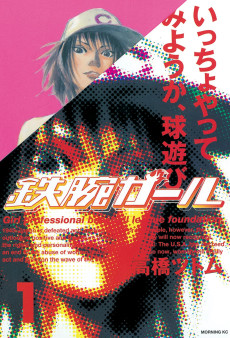 MANGA DramaTetsuwan Girl
MANGA DramaTetsuwan Girl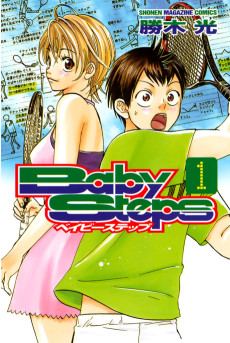 MANGA RomanceBaby Steps
MANGA RomanceBaby Steps
SCORE
- (3.6/5)
MORE INFO
Ended inMarch 8, 1999
Favorited by 61 Users

